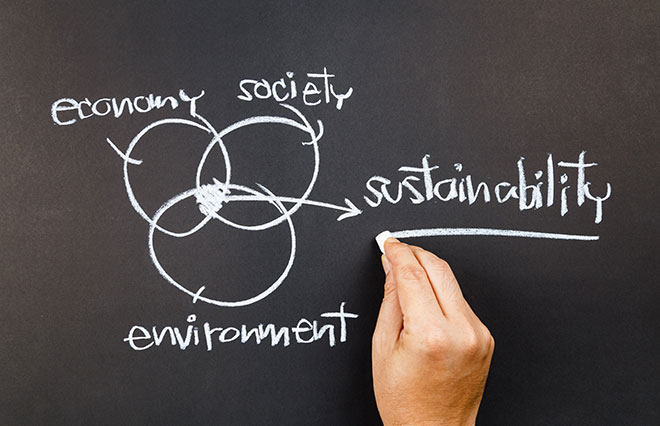The buzz words ‘circular economy’ seem to be cropping up more often across all media channels but what do they really mean for corporate sustainability? We have a client project that demonstrates best practice in this area that we’d like to share with you this month.
- What is the circular economy in a nutshell?
The circular economy is an alternative approach to economic development designed to benefit businesses, society, and the environment. It’s a modern alternative to a take-make-waste model that aims instead to keep resources in a perpetual loop of usefulness, ensuring that their maximum potential value is extracted during each service life. Research indicates that 92% of the world’s resources are only used once, in a single product, before being thrown away. This waste represents an enormous pool of resources that can be exploited with minimal impact on the environment. The role of resources in the circular economy can be summarised in four central tenets: reduce, reuse, recycle and recover.
- How does this new concept apply to electronics?
Waste Electrical and Electronic Equipment – WEEE – is created when an organisation or individuals dispose of anything from large business assets, to bulky white goods and handheld devices. Given so many technological devices can be refurbished, reused, resold or recycled, businesses are increasingly viewing them as a circular economy opportunity rather than a waste challenge. The volume of technotrash that a business generates will of course depend on its size but in a digitised world this topic is increasingly relevant to virtually every organisation.
- Technology reuse in action
Reuse is the holy grail for hardware and device sustainability as this option repurposes 100% of the physical resources used to manufacture them. Our client had 200 - redundant to them –Dell Latitude D420 laptops. Whilst these machines were all fully functioning, the operating system was no longer supported in the UK and couldn’t be upgraded because of the age of the devices. With their adapters each of these units weighs approximately 1.5kg so our initial goal was simply to prevent around 300kg of avoidable landfill.
- Ensuring data security prior to reuse
While data security often takes centre stage in company procedures, it can get overlooked when it comes to e-waste management. It’s vital that devices like laptops, which routinely store sensitive information, have all data permanently removed from their hard disk before reuse. Our client wanted to donate the laptops to charity and was reassured that TEKrefresh would effectively deliver the professional removal of all data. The clean-down was delivered within the parameters of the US Department of Defense standard - DoD 5220.22-M 7 pass data sanitisation method. This is the official data wiping standard for several US governmental agencies and guarantees the eradication of all data. TEKrefresh also ensured that the hardware was fully checked prior to the installed operating system being returned to original manufacturer settings.
- Our charity partner the Chailey Newick Colts Gambia Support Group
We were already connected with this fantastic Sussex based charity that supports communities across The Gambia to improve health, education and economic outcomes and their development projects seemed like an ideal match for our client. CNCGSG, who have raised 10s of thousands of pounds for schools in The Gambia, distributed the laptops to sixth form students attending 3 different schools on MacCarthy Island in the Central River Division of Eastern Gambia. American volunteers taught them how to use the laptops and at the end of the course, each student was given the laptop as a gift to help them in their future. Every single participating student passed the course successfully and went on to either get a job or to create work for themselves using their new skills and this also brought wealth to their local village where new businesses were created.
- Achieving sustainability in the circular economy
The approximate monetary value of our client’s donation was the best part of £10k but the real-life impact of their generosity was immeasurable. This example of a corporate sustainability project was a triumph on three fronts. It greatly enhanced the long-term employment prospects of 200 young people by giving them access to technology for the first time, it cost our client no more than routine secure e-waste management and also protected the environment. With our help these end of ‘first-life’ units were injected into the circular economy and the positive footprint of this project was so much wider than anticipated. Making the most of the circular economy is all about having a clear understanding of your choices and finding a trustworthy sustainability service partner to work with who will take your data security as seriously as you do. Click here to book a free of charge consultation with a device recycling expert.
